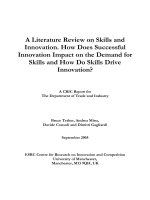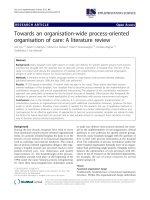How to do a literature review an overview
Bạn đang xem bản rút gọn của tài liệu. Xem và tải ngay bản đầy đủ của tài liệu tại đây (152.17 KB, 31 trang )
How To Do A Literature
Review: An Overview
Frederic Murray
Assistant Professor
MLIS, University of British Columbia
BA, Political Science, University of Iowa
Instructional Services Librarian
Al Harris Library
Outline of session
•
•
•
•
•
•
•
•
What is a literature review?
Why review the literature?
Plan your search/Keywords/Boolean
Snowballing/Tracking Citations
Choose appropriate Databases/Sources
Sample searches
Read and evaluate
A good literature review…
Major Concerns
• Right keywords to search
• Narrowing the search
• Using the library effectively
What is a literature review?
“… a systematic…method for identifying,
evaluating and interpreting the …work
produced by researchers, scholars and
practitioners.”
FINK, A., 1998. Conducting literature research reviews: from paper to the
internet. Thousand Oaks, CA: Sage., p.3.
Why review the literature?
“…without it you will not acquire an
understanding of your topic, of what
has already been done on it, how it
has been researched, and what the
key issues are.”
HART, E., 1998. Doing a literature review: releasing the social science
research imagination, by E. Hart and M. Bond. London: Sage., p.1.
Define what you want to know
“I am looking for literature and data
that focus on incarceration as a
deterrent for crime ”
Use this statement to choose
keywords and key phrases
Define key words and
phrases
•
incarceration
•
deterrent
•
crime
Identifying Keywords
• Identify the significant terms and
concepts that describe your topic from
your thesis statement or research
question.
• These terms will become the key for
searching catalogs, databases and
search engines for information about
your subject.
Boolean
• AND = Narrow
• OR = Expand
• NOT = Exclude
Class Exercise
• Keyword Building Exercise
Topic: Crime and Punishment
• Thesaurus.com
Define key words and
phrases
•
incarceration
•
deterrent
•
crime
Crime & Punishment
Prisons
Policies
Murder
Incarceration
Deterrent
Crime
Rehabilitation
Solutions
Robbery
We think of citation patterns as the
flow of information," says Carl
Bergstrom, a biologist at the University
of Washington. "That's what a citation
is — the trace that an idea flowed
from one place to another."
Snowballing
• Building on the works of others
• A scholarly article will always have
References/Bibliography
• A bibliography is always ripe for the
picking…
Tracking Citations
Wild, D. (2003, March). GOING TO WAR:
A LITERATURE REVIEW. Emergency
Nurse, 10 (10), 18. Retrieved June 4,
2009, from Academic Search Complete
database
Tracking Citations
Wild, D. (2003, March). GOING TO WAR:
A LITERATURE REVIEW. Emergency
Nurse, 10 (10), 18. Retrieved June 4,
2009, from Academic Search Complete
database
The Citation Video
Class Exercise
• Periodicals List Worksheet
• Do we have access to the Journal?
• If so, do we have access to the specific
article?
Choose Appropriate Databases
• Google is not (usually) the answer
• Start with Library Resources for your
Subject First
• Search a range of databases
• Think about the range of sources:
books, journal articles, statistics,
websites, conference reports…
EBSCOhost Databases:
• Academic Search Complete
• PsycARTICLES
• SocINDEX with Full Text
• TOPICsearch
Working with EBSCOhost
• Create a Folder
• Narrow Your Search
– Scholarly (Peer Reviewed) Journals
– Filter by Publication Date
– Filter by Subject:Thesaurus Term
– Filter by Publication
• Cited References
The Citation Video: Advanced
Class Exercise
• Academic Search Complete Worksheet
• Work with your topic
• Work together
• Get familiar with narrowing your results
Google: Improve Your Searches
Site Specific Command
What it does: searches only specific domains
What to type: prison overcrowding site:edu
prison overcrowding site:gov
Google Scholar
• Google Scholar provides a simple way
to search for scholarly literature.
Search across many disciplines and
sources: peer-reviewed papers, theses,
books, abstracts and articles, from
academic publishers, professional
societies, preprint repositories,
universities and other scholarly
organizations.









